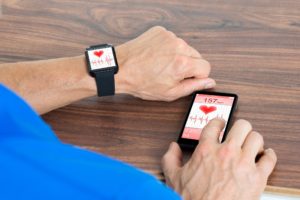 Heart disease continues to be the number one killer in America, even though many of us are aware of the risk factors and preventative measures to reduce our risk. By continuously monitoring your heart health, you can work on improving your heart health and reduce your risk of a cardiovascular event occurring.
Heart disease continues to be the number one killer in America, even though many of us are aware of the risk factors and preventative measures to reduce our risk. By continuously monitoring your heart health, you can work on improving your heart health and reduce your risk of a cardiovascular event occurring.
Aside from knowing your blood pressure and cholesterol numbers, other important heart health measurements can help you further improve your heart health. Knowing these measurements can help put you on a better path.
5 Ways to Measure Your Heart Health
Advertisement
Resting heart rate: As the name suggests, this is your heart rate when you are at complete rest. This is a simple way of gaining important insight about your heart health. Many wearable fitness trackers are now able to pick up on this, so you don’t even need to think about it as data is collected while you go about your day. A healthy resting heart rate is between 60 to 100 beats per minute (BPM). Depending on how athletic you are, this number can be lower than 60 BPM, which is okay. What is not okay is a resting heart rate over 100.
Heart rate recovery: Heart rate recovery involves how quickly your heart rate can come back down within a minute after peak exercise. Once again, this can be measured through a wearable device. It is suggested that a recovery rate of less than five BPM is strongly correlated with heart disease. A healthy adult should recover with 12 to 20 BPM.
Heart rate variability (HRV): HRV measures the variation time in between each heartbeat. This test is best measured with a multi-lead ECG. Healthy individuals have a high HRV while unhealthy ones have a low HRV. Knowing your HRV could help diagnose atrial fibrillation – irregular heart rhythm.
FIT treadmill test: This test is performed on a treadmill, where patients work until exhaustion as speed and incline increases every three minutes. Once maximum speed is reached, it is compared to a person’s maximum predicted heart rate (this is calculated with the formula 220-age). This percentage then becomes your FIT treadmill score. A score higher than 100 reveals potential heart problems, while scores zero to 100 reveal healthier individuals.
VO2 Max: This refers to the maximum oxygen uptake a person can take. It signifies a person’s aerobic endurance and can help predict an athlete’s capacity to perform a sustained exercise. To properly measure VO2 max, you need direct measures of inhaled and exhaled oxygen, which is then put in the formula 14.8 – (1.379 x T) + (0.451 x T2) – (0.012 x T3). Men over the age of 40 are considered healthy with a VO2 max of 31.5 to 40.
